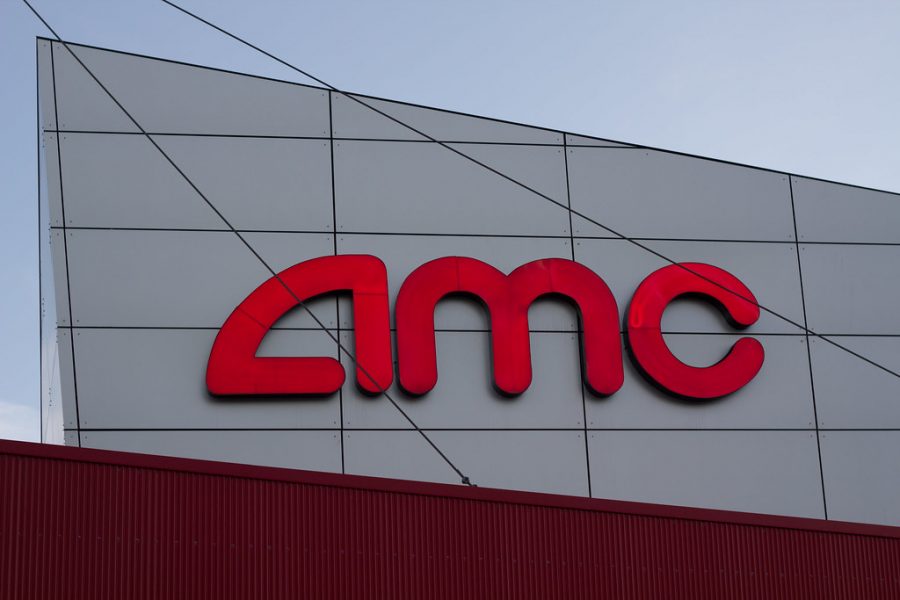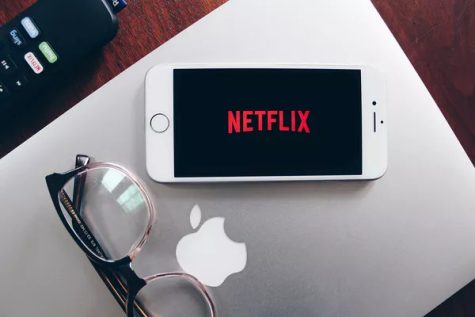Movie distribution changes due to COVID-19
“AMC Movie Theater” by Dave Dugdale is licensed under CC BY-SA 2.0
AMC movie theaters began to close some of its facilities at the end of March in response to dwindling ticket sales due to COVID-19.
The lights go out, the popcorn is ready, the screen flickers and the title of the newest blockbuster bursts on the screen. Only this time, the lights are from the living room, the popcorn was made in the microwave, and the screen is your own. With the rising popularity of streaming services, companies including Apple, Disney, NBC and DC Comics have recently hopped on the bandwagon. Considering the already dwindling success of movie theaters in response to streaming platforms, now, with new social distancing restrictions, getting people to buy tickets is nearly impossible.
However, theaters have tried to adapt. AMC theaters have implemented new safety precautions including required facemasks, reduced auditorium capacity, socially distanced lines and sanitizing stations. The staff is also tasked with cleaning frequently touched surfaces before each showing to help prevent the spread of the virus.
This comes after much delay by government officials to reopen recreational facilities in Florida. This hesitation has cost theater chains like Regal too much to stay open without steady income, resulting in them closing all 536 locations. Now that Florida has entered Phase 3, remaining theaters may have to fight to stay open.
Cinemas are fighting a two-front battle with their already declining audience. A survey done by Statista databanks company in June of 2019 found that only 46 percent of Americans even went out to see a movie more than once. One of the many reasons cited for the low turnout included high ticket and concession prices.
Senior Jenna Genader agreed with this reasoning claiming she enjoys going to theaters, but said “the prices are ridiculous.”
Streaming services have heard the cries of the public and provide a wide range of free movies, requiring only a monthly subscription. With Disney+ charging a monthly fee of $6.99; Netflix, $12.99, and Hulu $5.99 for the basic plan, the savings become clear to families after spending around 35 dollars for one movie at the theater.
When the pandemic closed theaters, they were faced with their biggest nightmare: movies meant to be seen in theaters were now heading to streaming platforms. The taped film of the Broadway smash “Hamilton” was a sure-fire hit to draw audiences to seats, however Disney+ announced that it would instead be dropping on their own platform.
The Wonder Woman sequel and Marvel’s Black Widow, usually bankable superhero movies that electrify ticket sales, delayed their release dates until further notice. The signs were clear for theaters across the country; there would be no summer blockbuster season this year.
If the public wasn’t allowed to go to the movies, the movies would have to come to them.
This may come as good news to those who prefer watching films on demand.
“You can stop the movie for breaks or when you need to refill your popcorn bowl,” sophomore Katherine Guía said.
Guía explained that “cinemas are freezing” and she dislikes hearing children “screaming at the top of their lungs in a cinema while still trying to hear.”
AMC sued Universal for releasing “Trolls World Tour” on demand instead of in theaters as previously arranged. AMC then stated that they would ban all of Universal movies in its theaters, which included more than 1,000 across the globe.
Universal Studios and AMC recently reconciled and created a compromise that will allow movies to head to digital release after playing in theaters for a few weeks.
While theaters may have won that battle, only time will tell what lies in store for them. Director Christopher Nolan’s science fiction blockbuster “Tenet” was released into theaters only. The movie has grossed 200 million dollars internationally, making back its budget.
Normally, this would be a huge disappointment for a movie of this caliber, however these are not normal times. Theaters see “Tenet’s” earnings as a $200 million promise from viewers around the world, that there is still an audience willing to risk venturing outside of their homes to experience cinema.
Other viewers may not always feel safe inside an auditorium, but many are travelling back in time to the era of drive-ins. Families, couples, old and young alike, stay more than 6 feet apart from strangers in the safety of their driver seat.
Drive-ins around the country have had a surge of popularity over the summer, with one even opening up in the Hard Rock Stadium, home of the Dolphin football games. However, due to football season starting and Florida’s classic rainy weather, movie showings there have been postponed.
Slowly but surely, movie productions are coming out of hiatus and blossoming back to life. Blockbusters like “The Batman” and “Matrix 4,” sure to draw big crowds, are just now heading back to work for a later release.
These movies may provide an insight into what actors and film crews will have to go through to produce a movie in the future. Actors and other set members are now being tested for COVID-19 daily. Movie musicals with a sprawling ensemble of dancers and singers all closely choreographed together, are a thing of the past, or at least on hold for the next few years. Future movies may have less cast and crew, perhaps steering towards more personal and small scale stories.
For some viewers, it’s hard to beat the classic movie experience.
“Going to the movies is really fun and it’s different than watching movies at home…and if you [go] to a movie that a lot of people like, it’s fun,” senior Alnahir Marquez said. “When I went to the premiere of Avengers, the reaction of everyone in the theater made it so much better.”
One thing is certain, no matter where movies are shown, they are sure to find an audience.









